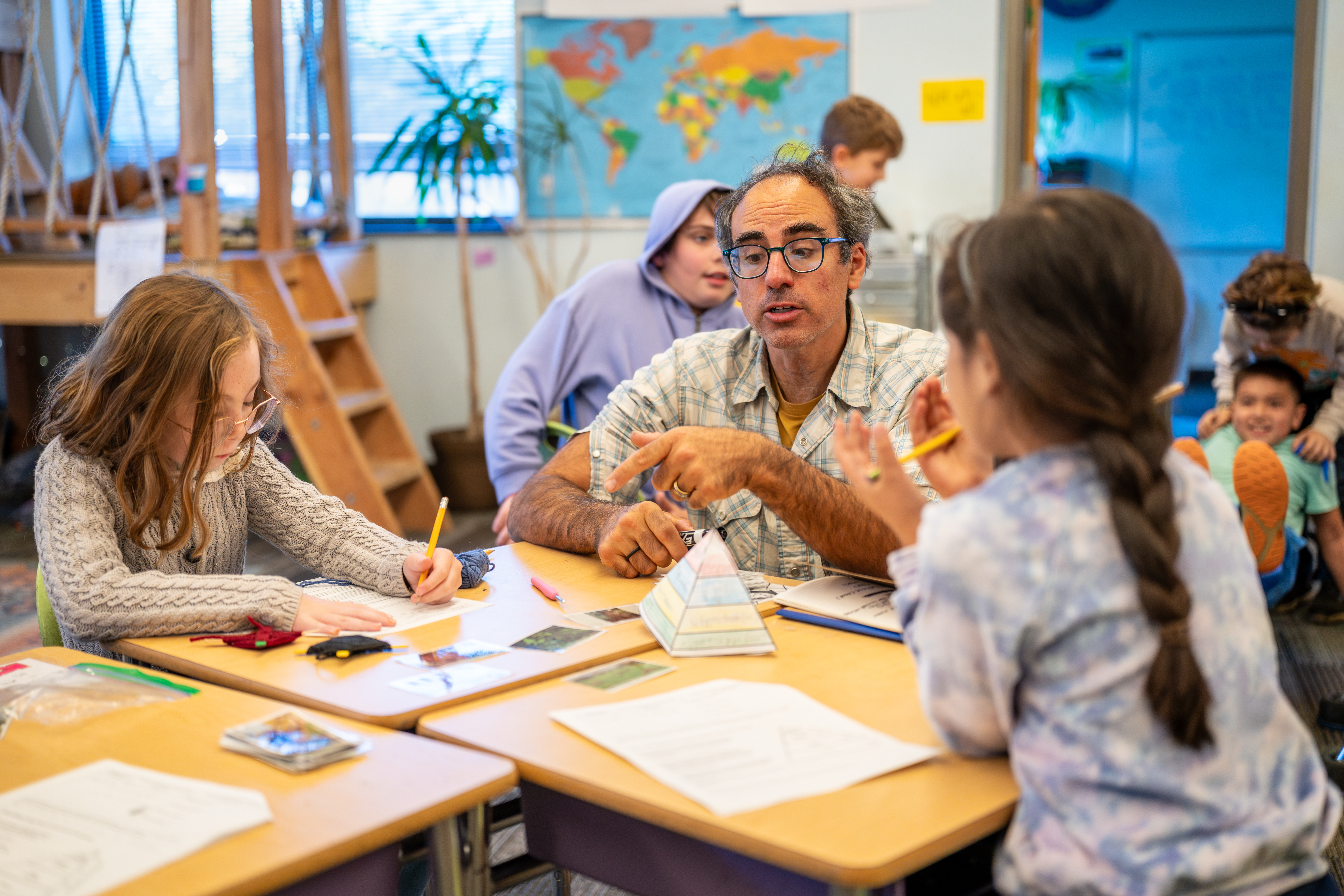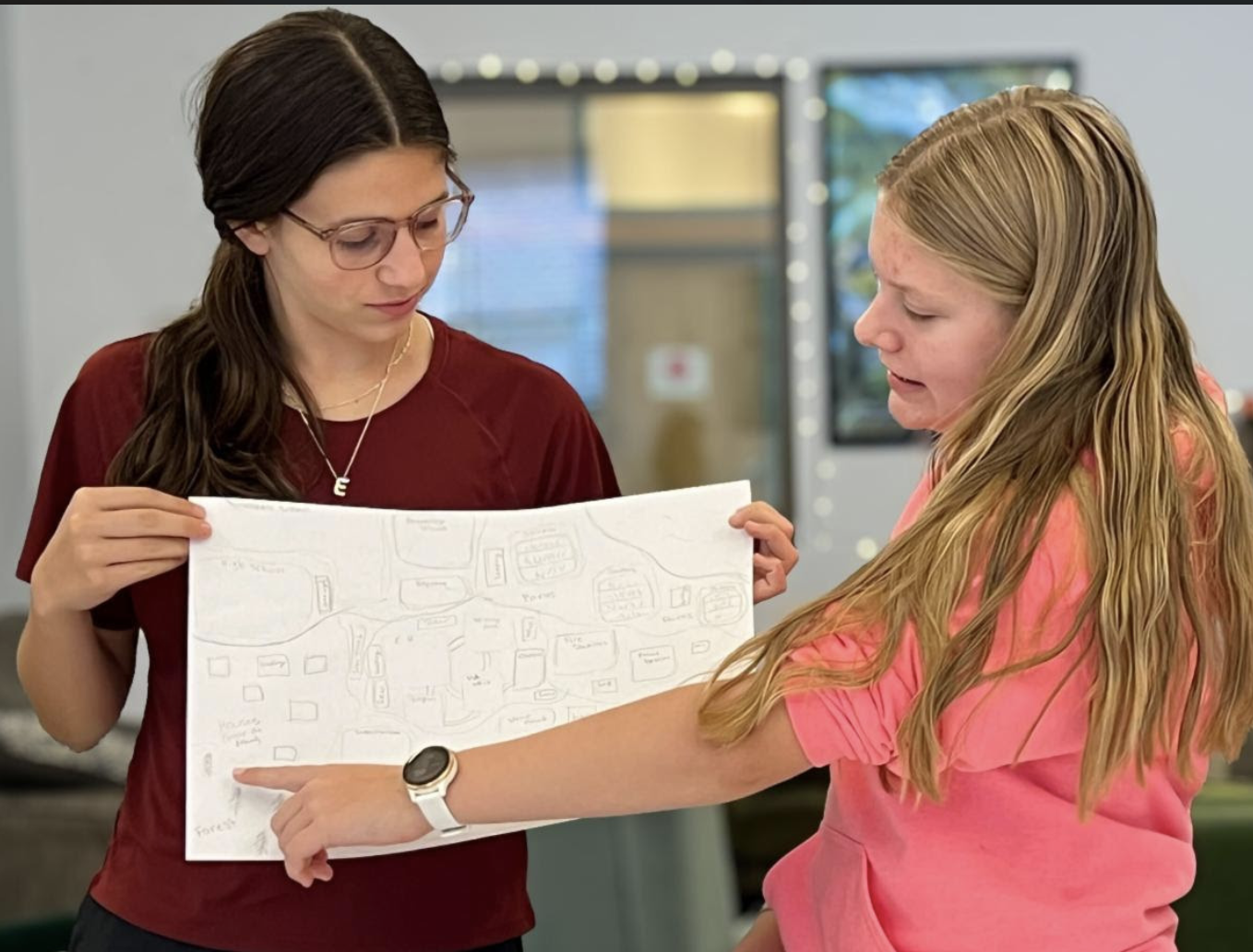In Ms. Camila’s Upper School Elective Perspective Drawing Skills class, students are learning to create…
Measuring Core Capacities

By Jamie Schefen
At Acera, we have a shared set of values which we hold as a community and capacities which we work on growing in our students. Instead of holding the common pedagogical approach that teachers should impart knowledge to students, we focus on using curriculum as a way to develop our core capacities: systems thinking, critical thinking and problem solving, creativity, ethical decision making, perspective taking, collaboration, emotional intelligence, and leadership.
Our curriculum is designed to allow students to engage deeply in content and develop essential skills alongside growing in our capacities. This may mean creating complex system maps in different ways across different age groups, grappling with ethical dilemmas through logic and literature, or learning how to approach challenges with creativity with resilience.
To some, core capacities seem amorphous, difficult to define, and thus difficult to measure. After all, how does one measure creativity? Can creative success not look infinite ways? But in truth, almost everything that is taught is amorphous.
Think about mathematics. What does it mean to grow in all of “math”? Is proficiency in math not also multifaceted? Progression in this subject is not always linear and truly growing in math has so much less to do with rote memorization and so much more to do with growing in deep conceptual understanding, logical reasoning, and problem- solving. True proficiency in math requires students to grasp concepts in real-world contexts, analyze problems, and communicate reasoning. It doesn’t exist on its own or within a single measure.
Just because it’s complex, does not mean it’s not possible to access. As Acera teachers, we focus on tackling the “amorphous” assessment of our core capacities. As a teacher, this will often mean 1. Focusing on 1-2 core capacities at a time, in an intentional way and 2. Collaborating with my students to create measurable milestones and breaking down important aspects of these core capacities.
Here is an example of how this looks in the classroom:
[image_with_animation image_url=”24846″ animation=”Fade In” hover_animation=”none” alignment=”” border_radius=”none” box_shadow=”none” image_loading=”default” max_width=”100%” max_width_mobile=”default”]
[nectar_btn size=”large” button_style=”regular” button_color_2=”Accent-Color” icon_family=”none” text=”Our Core Capacities” url=”https://www.aceraschool.org/learning/”][image_with_animation image_url=”24844″ animation=”Fade In” hover_animation=”none” alignment=”” border_radius=”none” box_shadow=”none” image_loading=”default” max_width=”100%” max_width_mobile=”default”]
Jamie Schefen is a Core Classroom Teacher and Coordinator of Acera’s Upper School.
This year, as part of our “Everything’s An Argument” theme, my students had a unit called “hunting beliefs” in which we discussed psychological reasons and implications of people hunting each other’s belief systems throughout history. Our essential questions for this unit included: how do cultural, social and psychological factors influence how we form our belief systems, and interact with belief systems that challenge our own? As part of this, we read the non-fiction book The Spirit Catches You and You Fall Down which follows a family of Hmong refugees and the cultural clashes they experience within the American medical system.
During this unit, we focused both on systems thinking and perspective taking. Diving deeply in systems thinking allowed students to understand the complexities of our belief systems and have practice in evaluating paradigms for these systems. In doing this, students were able to learn a new way to approach a belief system that is quite different from their own with curiosity instead of judgment in order to grow in perspective taking.
Before delving into our primary text, students learned about cultural practices that were quite different from their own. Students then created iceberg models for both our own cultural practices and other cultures. Their job was to find both a similar and conflicting “mental model” (underlying beliefs and values that keep these systems in place) in each instance of culture clash.
For example, when looking at a New Guinea tribe that eats deceased loved ones as a way to honor the dead, students found a similar mental model: it’s important to love and respect the dead, and also a conflicting mental model: It is respectful/disrespectful to eat their dead.
Additionally, when looking at gun control systems in Japan vs. the U.S., students found a similar mental model: safety is important, and a conflicting mental model: guns are important for protection and safety vs. guns are harmful to people’s safety.
Students’ ability to fill out the icebergs gave me the opportunity to assess their systems thinking skills; specifically, their ability to identify systems and their components and evaluate paradigms for systems. Additionally, their ability to generate both similar and conflicting mental models gave me the opportunity to assess their perspective taking skills. Specifically, their ability to understand the complex connection between their own beliefs and others, have cultural awareness, demonstrate curiosity about how others think, and approach a differing perspective with less judgment.
This work, of course, looks vastly different across different age groups. However, these skills can be assessed at any age level or readiness level by creating a curriculum that meets the student’s needs. For example, both an upper and lower school core teacher can assess a student’s ability to understand complex connections in systems and how one component of a system may have a large impact on the system in its entirely in two very different ways…
The upper school teacher may have students create systems maps with different types of feedback loops in order to understand this (see student example from world building elective on the right).
A lower school teacher may have each student represent a component of a system and talk about how each part relates to another. Students could take a ball of yarn and then pass the end of the string to the student that represents that component while saying the way each relates to each other. In the end, after the system is woven together by the string, one student can let go of the string and the class can talk about what happens to the entire system when one component is removed. Both of these activities assess the same skill within systems thinking in a different way.
Assessing core capacities like assessing anything is amorphous and difficult, but it’s also possible. Evaluating creativity is not about asking is this child creative? but instead asking, is this evidence of creative growth for this student?
As an Acera teacher, I love focusing on these core capacities across all aspects of the curriculum: in my planning, in my teaching, in my progress report comments, etc. Building strong system thinkers, problem solvers, and critical thinkers starts with us actively providing our students feedback on our capacities.
[divider line_type=”No Line”][image_with_animation image_url=”24843″ animation=”Fade In” hover_animation=”none” alignment=”” border_radius=”none” box_shadow=”none” image_loading=”default” max_width=”100%” max_width_mobile=”default”][divider line_type=”No Line”][image_with_animation image_url=”24848″ animation=”Fade In” hover_animation=”none” alignment=”” border_radius=”none” box_shadow=”none” image_loading=”default” max_width=”100%” max_width_mobile=”default”][divider line_type=”No Line”][image_with_animation image_url=”24849″ animation=”Fade In” hover_animation=”none” alignment=”” border_radius=”none” box_shadow=”none” image_loading=”default” max_width=”100%” max_width_mobile=”default”][divider line_type=”No Line”][image_with_animation image_url=”24845″ animation=”Fade In” hover_animation=”none” alignment=”” border_radius=”none” box_shadow=”none” image_loading=”default” max_width=”100%” max_width_mobile=”default”]

